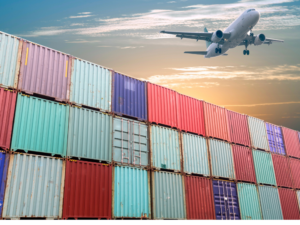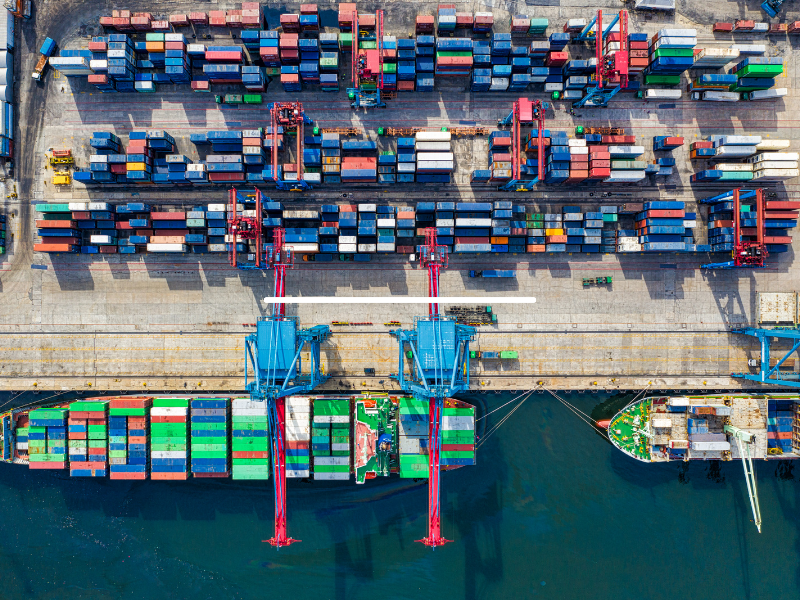What’s the difference between freight and a package? To the uninitiated, the logistics industry is complex. For the average online shopper, parcel or packages turning up at their door or the local post office is the only reference they have for shipping. For manufacturers and retailers, images of individual box-sized goods are conjured up. However, there is an entire shipping industry that faces goods in much larger quantities; dealing with pallets, truckloads, and shipping containers of freight.
As the world becomes smaller with increased connectivity and globalisation, many companies and individuals turn to the logistics, transport, and supply chain industry to manage and move goods by air, rail, road, and sea. That being the case, there are many different services essential to the effective functioning of the industry. Two of which are freight services and package shipping. So, what’s the difference between these two? Within this article, we’re going to answer just that: freight vs package shipping.
Freight Vs Package Shipping
In essence, freight shipments are more significant quantities of goods shipped in bulk. Parcel shipments, on the other hand, are smaller packages sent individually. Within in this article, we’re going to dive a little deeper to provide you with a comprehensive guide to the question: what is the difference between freight and shipping?

What Is Package Shipping?
Small package or parcel shipments are used by businesses and individuals sending or receiving small packages that typically weigh less than 50 or 70 kilograms. These services are often easy to manage as packages are sorted automatically on conveyor belts and are handled by individuals.
Package shipping is restricted to a localised zone, such as a city, town, or rural area. Package or parcel shipping is ideal for companies to fulfil speedy product deliveries straight from their warehouse to the customer’s door. That being said, package shipping may also be used to handle and relocate products from one warehouse to another.
For smaller parcels, package shipments offer several benefits. Namely, this form of shipping is ideal for delivering smaller individual packages, for speedy overnight or same-day shipments, shipping from drop-off locations and delivery to residential addresses. Ecommerce is an excellent example of parcel shipping. When you purchase something online from a company, they will package that individual item and send it to your location via a small parcel carrier.
When considering freight vs package, businesses will factor in both the weight and size of goods, as well as the parcel’s final destination.
Package shipments are economical for shipping a few parcels at a time, to a localised area. However, the security of property is not always guaranteed. Unlike freight trucks that utilise palettes and crates to package shipments securely, parcels and boxes are packed loosely on trucks, making items vulnerable to damage, breakages and potentially becoming misplaced.
The key characteristics of parcel shipments include:
- Small, light packages
- Loads generally under 60 kilograms in weight
- Parcel trucks have a daily calculated route that seldom changes and make several stops on the way to their final destination
- Parcel trucks can load anywhere between 50 to 100 packages or more onboard, depending on the average size of each package

What Is Freight Shipping?
Freight is a term that refers to larger shipments of products in bulk, usually ranging in the hundreds or more. Freight shipments are complex, often incredibly valuable, and subsequently, typically require a higher level of management than general parcel shipments.
The main difference between freight vs package is that the size and quantity of freight shipments are often too large for small parcel shipping companies to manage. Generally, shipments weighing over 70 kilograms are considered freight. Goods are placed on palettes, in sturdy containers or crates, and for this reason, freight is typically at a lower risk of damage.
Freight items are diverse in nature and cover a broader range of goods than parcel shipments.

Freight items may include:
- Agriculture and produce
- Beverages
- Fridges, freezers, and dishwashers
- Garden equipment, such as lawnmowers, electric hedge trimmers
- Dangerous goods
- Carton and satchel freight
- E-commerce products, retail and wholesale supplies
- Pet supplies
- Medical, hospitality, cleaning and PPE
- Computers, IT products and other equipment
- Liquids and gas
- Bulk commodities
- Packaging
- Vehicles and parts
- Industrial equipment and machinery
- Building and construction materials
- Steel products
- Palletised freight
- Furniture, gym equipment and bulky goods
Freight shipments leverage various modes of transport to deliver goods efficiently. The most common transportation methods for freight include Full Truckload, Less Than Truckload, Intermodal and Multimodal:
-
Full Truckload (FTL) Transportation
FTL shipments utilise the entire space available in a freight truck, transporting products or items that weigh over 7,000 to 10,000 kilograms. This method is ideal for products that require extra care and protection during transportation to remain intact and in their original condition and require a shorter arrival time. There are several types of freight trucks available; a business can request a specific kind of truck to transport their freight. For example, for food products and beverages, refrigerated trucks are required, and for goods that don’t require the enclosure of a dry van, flatbed trucks are ideal.
-
Less Than Truckload (LTL) Transportation
LTL shipments transport smaller cargo that typically weighs more than 70 kilograms, but less than 7000 kilograms. You may be inclined to use an LTL shipment if you’re only moving a few pallets, whereas FTL truckload shipping is ideal for shipping more pallets.
For smaller shipments, LTL shipping is cost-effective when truck space is shared with other businesses, as the costs are divided between each shipper by the weight of their items. Shipments are often loaded together with other shipments to fill the truck to capacity.
-
Intermodal Transportation
Intermodal freight delivery services move freight from one place to the other, with various forms of transportation. Shippers load goods into intermodal containers to move shipments seamlessly between trucks, aircraft, trains, and cargo ships. As freight is transported between several different modes of transportation, the product remains in one container throughout the trip. Intermodal shipping is cost-effective, reliable, fuel-efficient, and more sustainable when compared to long-haul trucking.
-
Multimodal Transportation
Similar to intermodal shipping, multimodal transportation combines different vehicles to ship products to a final destination. The difference is that multimodal shippers charge individually for each transportation mode. In other words, when you receive the bill for your shipment, multimodal transport will charge you separately for the cost of their services, and you will be presented with separate bills for each mode of transportation.

To summarise, the key characteristics of freight shipping include:
- Larger loads, such as palettes of products that have been packaged together or wrapped as one or more
- Loads can vary anywhere between 70 kilograms to a tonne or more in weight for a typical extensive haul trip
- Freight transportation typically travels from point A to point B
- The truck can be larger than 58 feet
- Deliveries usually take longer than package parcels because service areas are larger
The Freight Specialists That Australians Trust

When it comes to freight vs package shipping, the differences are cut-and-dried. Now that you’ve got a better understanding between the two in logistics, you should be well versed and prepared to engage either a freight management or shipping company for your unique set of requirements.
If you’re looking for the experts in freight transportation, look no further than Freight Match Australia.
Freight Match connects you with thousands of approved providers that offer tailored and cost-effective solutions across the country. Our online freight matching service gives you freight options fast. We ensure secure, time-sensitive deliveries from A to B, ensuring your goods arrive in perfect condition every time. From local to interstate freight, bulk freight, parcel freight and furniture transportation, Freight Match are the specialists you call in when you need to safely transport goods.
Available 5 days a week – enquire online or give us a call on 1300 419 825 to discuss your freight query today.
